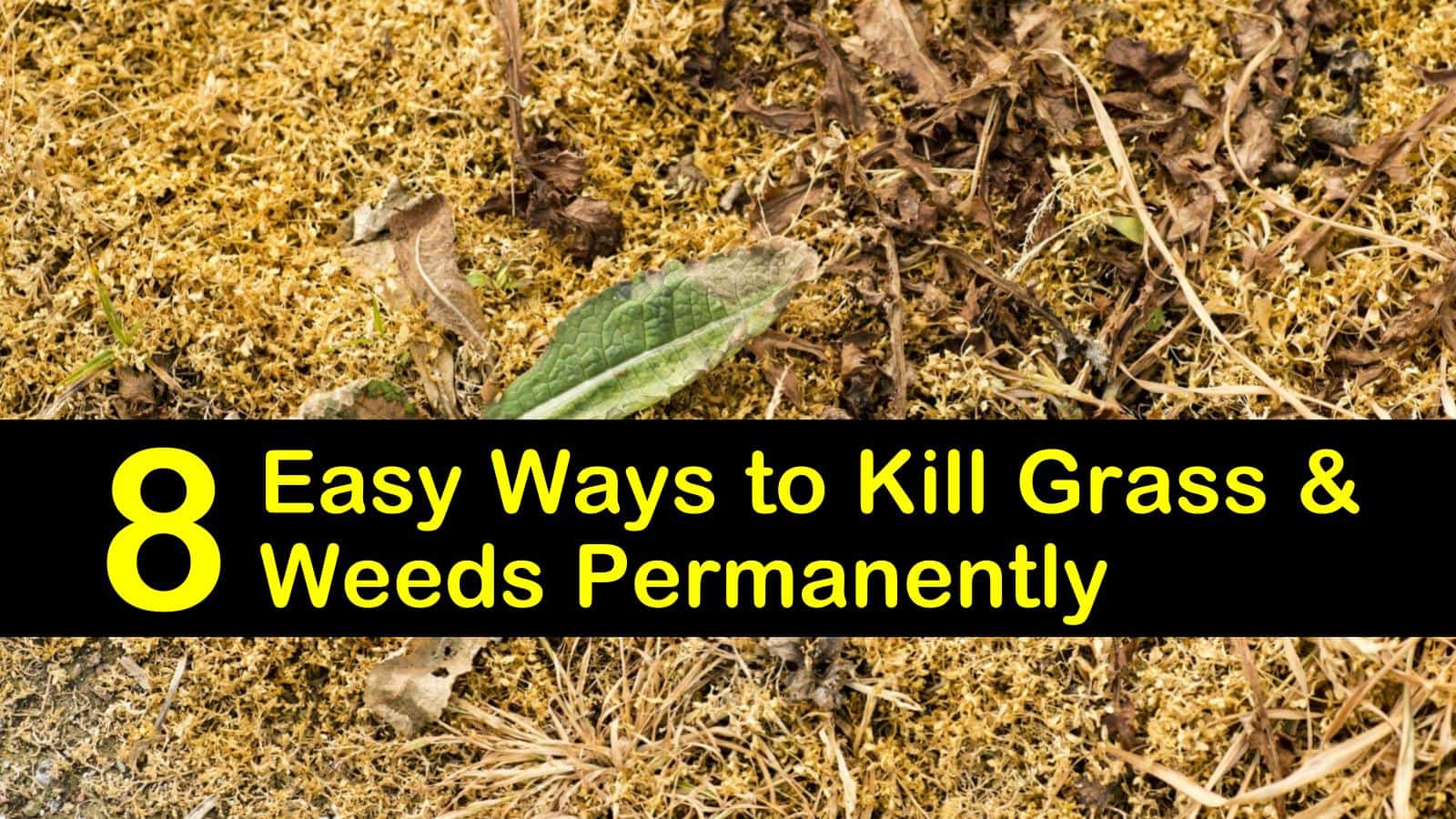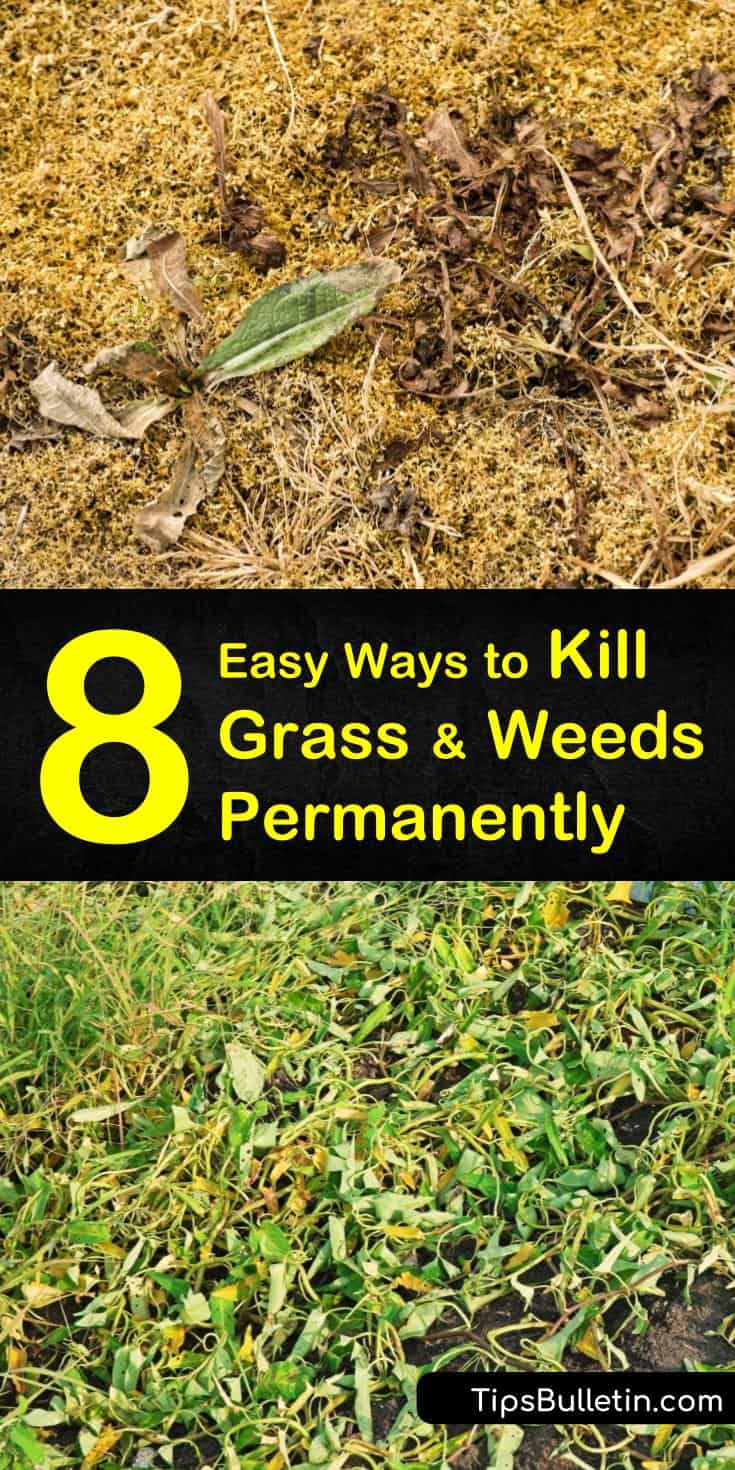The worst part about weed control is that it never seems to stop. Once you remove one series of stubborn lawn invaders, a whole new fleet is ready to spring into action. So, what kills grass and weeds permanently without the need for pulling them loose week after week?
There are many excellent weed-killing solutions to choose from, though the key to mastering the absence of weeds comes down to consistency and utilizing numerous strategies. Another question you may be asking is, will vinegar kill grass and other weeds? Are there natural ways to rid your yard of weeds and invasive grass without damaging the lawn itself?
When maintaining the integrity of your lawn, the level of weed infestation in your yard influences your game plan. While an organic weed killer like vinegar undoubtedly does the trick, it may also kill the rest of your lawn in the process.

Smart Ways to Kill Weeds and Grass Permanently
You should also determine whether you need a spot treatment, an all-over application, or whether you should utilize a selective herbicide when treating the lawn. In this article, you will also learn will bleach kill grass, and what methods are safe to use around other plants.
Finding the most effective recipes for killing roots also depends on the type of plant you’re eliminating. Here is a collection of some of the more common varieties of unwanted grass and other weeds that invade lawns.
While some weed control methods wipe out every type of vegetation in their path, a broadleaf herbicide targets only those weeds with broad leaves, like dandelions, which leaves your grass virtually unharmed.
Some methods also work better on annuals than they do on perennials. Before you begin your lawn care process, know which weed you plan to control.
Will Vinegar Kill Grass?
Using pure vinegar is one of the best natural crabgrass killers. Not very particular about the target it chooses to remove, vinegar dries out the plant and stops it from distributing much-needed hydration throughout the rest of the plant.
For best results, use a type of vinegar with a higher concentration of acetic acids, such as cider vinegar or horticultural vinegar. However, white vinegar is often still just as useful for killing clover in grass or some other type of unwanted vegetation. In any case, your local grocery store carries all three.

This homemade weed killer works on the plant, but does vinegar kill grass roots, as well? Even though vinegar works best when applied to the tops of the weeds, it is not always as successful at root killing.
Typically, vinegar kills the plants from the top down to make it easier for the gardener to extract the plant. However, multiple applications of vinegar withhold enough moisture and nutrients from the plant that it eventually kills the roots as well. It only requires a little bit of time and patience to completely get rid of weeds for good.
Add Salt to the Weed Wounds
Though a higher concentration of vinegar typically kills weeds after a couple of applications, there are other ingredients you can add to make the solution even more successful. Some plants don’t automatically soak up the vinegar, making it difficult for them to absorb the harmful spray.
Using dishwashing soap is the perfect way to break up the surface tension and allows the vinegar to stick to the plants. For best results, use this spray on a sunny day to dry up weeds even faster.
For killing weeds in gravel driveway or anywhere else they shouldn’t be, mix the ingredients in a large bucket, and transfer part of it to a spray bottle for more accessible application. Spray the plant, soaking the leaves and soil surrounding it.
When selecting the right type of salt, make sure that you use table salt or rock salt instead of Epsom salt. Epsom salts provide nutrients to the weed, allowing it to increase even faster than before rather than drying it out.
For how to get rid of nutgrass and other weeds permanently using this formula, spray the area at least once a week until the plants are completely gone. Repeat applications are usually necessary to reach the roots. Add grass seed to the bare area or create a new garden spot where the weeds once were.
Strengthen Lawn for a Stronger Defense
One major contributor to weed control is lawn care. Lawns that are healthier develop deep root systems and are better equipped to handle weeds on their own. What constitutes a healthy lawn, and how can you use this information to remove weeds permanently from your yard?
Despite popular belief that a shorter yard is healthier, it’s essential to let your lawn grow in just above three inches, which is just enough length for the grass to soak in more sunlight and develop more extensive, healthier root systems. With one simple adjustment to your mower, you’re already on the fast track to improving growing conditions.
Mowing your lawn regularly is also an excellent weeding tool, as trimming the tops of many common weeds weakens the plant over time.Another critical factor to consider when handling weeds is to aerate the soil. Do not do this while you still have weeds, since this spreads the weed seeds to other parts of the lawn.
However, this is an incredible preventative measure to take when improving the soil conditions by providing better airflow and more nutrients. A similar process also aids in duckweed removal in ponds by perforating the top of the water to prevent water from becoming stagnant.
Use Chemical Control Method to Kill Weeds
Another effective method for how to kill weeds is by using a store-bought chemical spray. A spray is one of the quickest ways to get rid of dandelions on your lawn for good. Depending on your weed problem, consider a selective weed killer to prevent killing other vegetation surrounding the weed.
While most weed killers like Roundup contain glyphosate, a non-selective chemical compound that kills both broadleaf weeds and grassy weeds alike, these sprays also kill any other plant it touches. This means your priceless flower beds suffer if caught in the crosshairs.
However, if you have broadleaf weeds like dandelions, a selective sprayer kills only the garden weeds without killing your grass. On the opposite side of the spectrum, other weed killer brands like Ortho Grass B Gone Garden Grass Killer work in flower beds to safely kill unwanted grass without harming the flowers themselves.
Most chemical control brands feature a sprayer and need diluting before using. This design allows you to cover a large area quickly without buying a ton of products, which is helpful in more extensive weed infestations.
Try Soil Solarization
When looking at chemical-free alternatives to how to kill grass and other invasive weeds, solarization is a long-term process that removes weeds from your yard permanently. Successful at controlling bacteria, weeds, and even common pests, solarization includes covering the earth with a plastic tarp to trap the sun’s energy underneath and to heat the soil.
This strategy usually works best with a transparent tarp cover made from polyethylene, rather than white or black plastic. To use this method, clear away any of the plants and debris in the area, then water the soil until it is thoroughly saturated.
For a natural way to get rid of crabgrass, dandelions, or other pesky weeds, cover the space with your clear plastic tarp, then bury the edges deep into the ground to trap in the heat. If necessary, weigh down the edges to ensure that the area is completely covered.
Leave the cover in place for at least four weeks during the hottest time of the year. After four weeks, the soil is ready for planting other vegetation in it again.
Baking Soda – The Powerful Natural Weed Killer
If you’re still looking for that wonderful, natural weed killer, then baking soda is your next best bet. Similar to how vinegar works, baking soda absorbs all the moisture out of the plant when applied to it, leaving it dry and unable to regulate its moisture content. Only a teaspoon of baking soda is necessary for each plant you want to eliminate.
For one of the best remedies for killing weeds and grass where they shouldn’t be growing, start by wetting the soil so that it is moist but not overwatered. Next, sprinkle a teaspoon of baking soda over the top of the entire weed, including the leaves and the soil surrounding the base.
Leave it for the plant to absorb, then reapply in approximately one month if you still notice weeds growing. It’s important to realize that this method is not as successful with controlling weeds in areas with high salt content in their soils already, such as with plant life near the beach, but it does work well on average soil.
Will Bleach Kill Grass?
Absolutely! If you’ve run out of all the other options to kill weeds, then bleach destroys any piece of vegetation it touches. This DIY grass killer recipe also kills any plants you don’t want to part with, so only use it in areas where there are no other plants around. Wear protective clothing and gloves when handling bleach.
Stir the bleach solution in a large bucket using a long-handled spoon or piece of wood to blend the ingredients. Pour the formula into a small spray bottle and cover the remaining bleach solution with a plastic tarp.
If you do not use the rest of the bleach after 24 hours, then throw it out. Spray the weeds directly and repeat the process as necessary once a week, though one spray should be sufficient for killing the weeds on contact.
Prevent Weeds from Returning after Weeding
After you’ve completed the weeding process, add a pre-emergent to your soil to keep the weeds from coming back. Some brands even mix pre-emergents with fertilizer and other nutrients that support the growth of wanted plants in your yard. This process typically takes place in the early spring as a way to stop new weeds from forming when the growing season begins.
While there are pre-emergent herbicides that are safe to use in a flower or vegetable garden, another avenue to take is adding a ground cover plant or a layer of mulch. Adding either of these options reduces the amount of empty space left in a garden by taller plants.
Weeds thrive in these types of environments since there is plenty of space and sunlight available for them to grow. By adding mulch or a beautiful groundcover, you make it that much more difficult for weeds to claim a foothold in your garden.
Hopefully, we answered all your questions about permanently eliminating weeds, including will vinegar kill grass or not? Whether you want to kill grass, invasive perennials, or broadleaf weeds that return year after year with a vengeance, the solution to all your lawn weed nightmares starts here.

If you enjoyed reading about these phenomenal weed killer recipes, then don’t forget to share what kills grass and weeds permanently with every homeowner you know on Facebook and Pinterest.